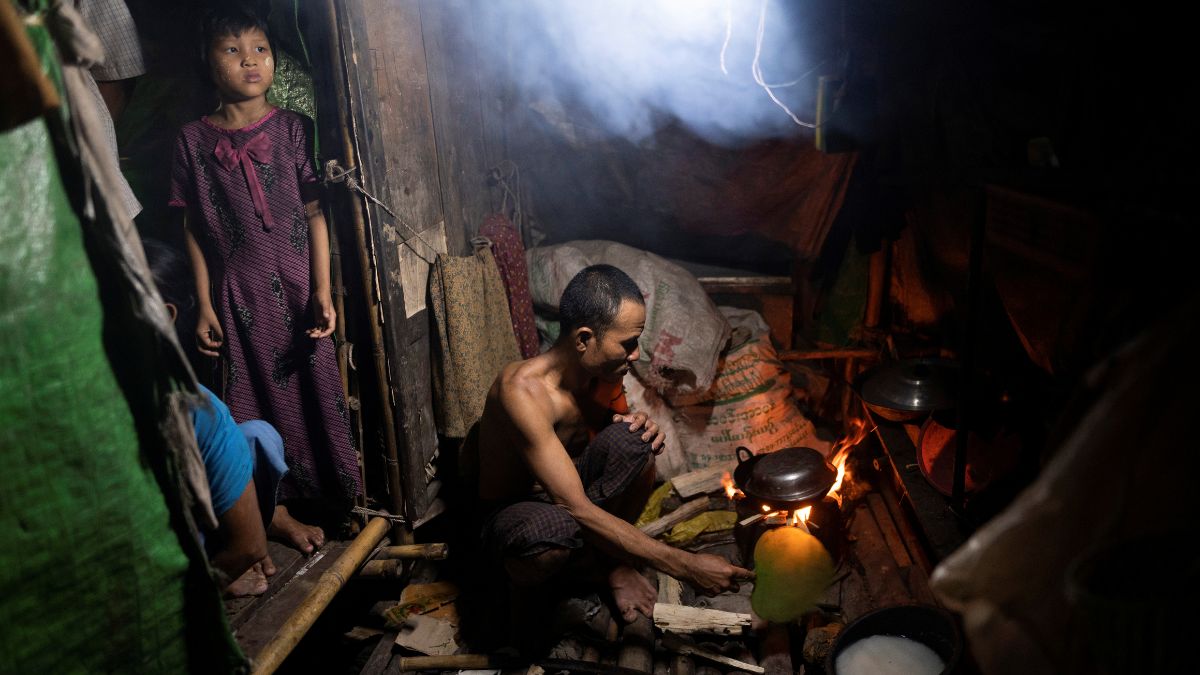Amid Myanmar’s escalating civil war, the military junta has adopted a cruel strategy to crush resistance in Rakhine state: the deliberate weaponisation of hunger.
With the conflict spreading, civilians caught in the crossfire find that food scarcity is becoming as lethal as the bullets fired by soldiers.
Rakhine state, long a powder keg of ethnic tensions, is now witnessing a new level of human suffering as the junta tightens its grip on aid routes and humanitarian access.
The military’s actions have drawn sharp condemnation from observers, who accuse the regime of systematically using starvation as a means to subjugate the local population and weaken support for the Arakan Army (AA), a powerful ethnic rebel group that controls significant territory in the region, CNN reported.
The junta’s blockade strategy
The junta’s blockade strategy, which includes imposing checkpoints, blocking roads and waterways, and denying access permits to humanitarian groups, has drastically reduced food supplies to areas controlled by the AA. The result is a growing humanitarian catastrophe in which nearly 900,000 people are at risk of starvation.
“They are using food as a weapon,” a senior aid official told CNN. “That much is clear.”
The situation is particularly dire in northern Rakhine, where aid agencies report that fewer than a quarter of the 873,000 people who need food assistance have received any. Prices for basic staples like rice, fuel, and cooking oil have skyrocketed, driven up by shortages created by the junta’s control of supply routes. With the junta refusing requests to transport goods into the region, even those who still have money cannot afford the inflated prices.
Impact Shorts
More Shorts“People are surviving on the bare minimum,” Ejaz (pseudonym), a local aid official. “I’ve seen it with my own eyes—families reduced to eating rice and salt, and even that is running out.”
Struggle in displacement camps
Reports from the region paint a harrowing picture of the suffering endured by civilians. In a makeshift displacement camp at a crowded monastery near the regional capital of Sittwe, a lone monk struggles to feed about 300 people who have sought refuge there after being driven from their homes by the conflict.
“There are days when we have no food, even though we are hungry,” CNN quoted Khin Mar Cho, a mother who fled to the camp with her young son after soldiers stormed her village, detained the men, and shot her brother, as saying. “I cannot feed my kid anything more than meals donated by people because I don’t have a job or income, and all the male family members have been taken away.”
Crackdown on aid efforts
The junta’s strategy extends beyond mere blockades. Aid workers have reported that local humanitarian groups caught trying to deliver food and supplies without permits have been arrested. In some instances, relief cargoes have been seized or destroyed by the military, further exacerbating the food crisis.
In June, a World Food Programme warehouse in Maungdaw was looted and burned, depriving the community of urgently needed food aid.
The United Nations Office for the Coordination of Humanitarian Affairs (OCHA) has attempted to negotiate with the junta to lift the blockade and allow aid to reach those in need, but progress has been slow. Informal talks with senior junta officials in the country’s capital have yielded little more than vague assurances, and no travel authorisations have been granted to humanitarian partners to operate outside of Sittwe township since November 2023.
Despite the overwhelming evidence of the junta’s role in the crisis, Myanmar’s government continues to deflect blame. In a statement to CNN, Myint Kyaw, Deputy Permanent Secretary for Myanmar’s Ministry of Information, claimed that rebel groups, not the military, were responsible for restricting aid. “The Myanmar government is committed to the equality of all citizens,” the statement read. “Every citizen has the right to travel freely without any restrictions.”
International community: A silent bystander
As the junta continues to tighten its stranglehold on Rakhine, the international community’s response has been alarmingly muted. The UN’s humanitarian response program in Myanmar is among the most underfunded in the world, with only 20 per cent of the necessary $1 billion raised for aid efforts through 2024. “We have become invisible,” lamented a senior UN aid official in Myanmar. “Donors will find it difficult to fund missions that are invisible.”
For the people of Rakhine, the consequences of this invisibility are all too real. As hunger becomes a weapon in this brutal conflict, the lives of countless civilians hang in the balance, dependent on a world that seems increasingly unwilling—or unable—to help.
)